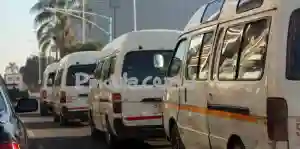Commuter omnibus operators in Bulawayo have raised their fares, with prices ranging from $600 to $1,000 per trip, depending on the time and distance, prompting some commuters to call for the government to re-ban the kombis. This is up from the previous fare of $500.
Fares are highest during peak hours and when Zupco buses are not available. Commuters feel the operators have not learned their lesson. One angry commuter told the Chronicle:
During the Covid-19 era the Government banned kombis because of among other things, wantonly increasing fares. Operators should use the official bank-rate. Why are they suddenly increasing fares when they know most of us earn RTGS and fuel prices have remained steady for the past months?
Mr Ephraim Dube, a resident of Pumula South, expressed outrage at the increased kombi fares, as they now consume most of his salary. He noted that some suburbs still charge normal prices, which is frustrating. He is worried about the upcoming school opening week, as he and his children all study in town and the increased fares will be difficult to afford. He mentioned that one of his children takes two kombi trips per day, making it even more challenging. If he lived closer to town, like in Mpopoma, he would walk and not have to deal with the high fares.
Mrs Elsie Moyo, a commuter from Magwegwe West, accused kombi operators of contributing to inflation. She stated that when they increase their fares, moneychangers also raise their rates. She believes that kombi operators should be monitored and punished for raising their rates in bond currency. Mrs Moyo feels that the operators do this intentionally to force people to pay in foreign currency, as they raise their rates and leave commuters with no other option.
Kombi associations Tshova Mubaiwa and Bupta stated that their local currency charges are based on the prevailing exchange rates. Mr Ndabazabo Mabunda, the marketing director of Tshova Mubaiwa, explained that the fares have not increased, but the rate has changed due to the influence of commuters.
Mabunda claimed that commuters often refuse to accept local currency change, claiming it is too little, so the kombi operators end up charging more to balance their money. He emphasised that the high local rate charges are mainly due to the behaviour of the commuters, as the fares themselves have not been increased. The Bupta administration director, Mr Alfred Ncube, said the association had not increased fares but operators were working with the existing rate of exchange.
The Zimbabwe dollar has been shedding value against other currencies prompting service providers to raise charges and fees. However, there are some service providers who are raising prices in both local and foreign currencies. Kombi operators often raise their fares during holidays such as Easter and Independence due to high demand.

